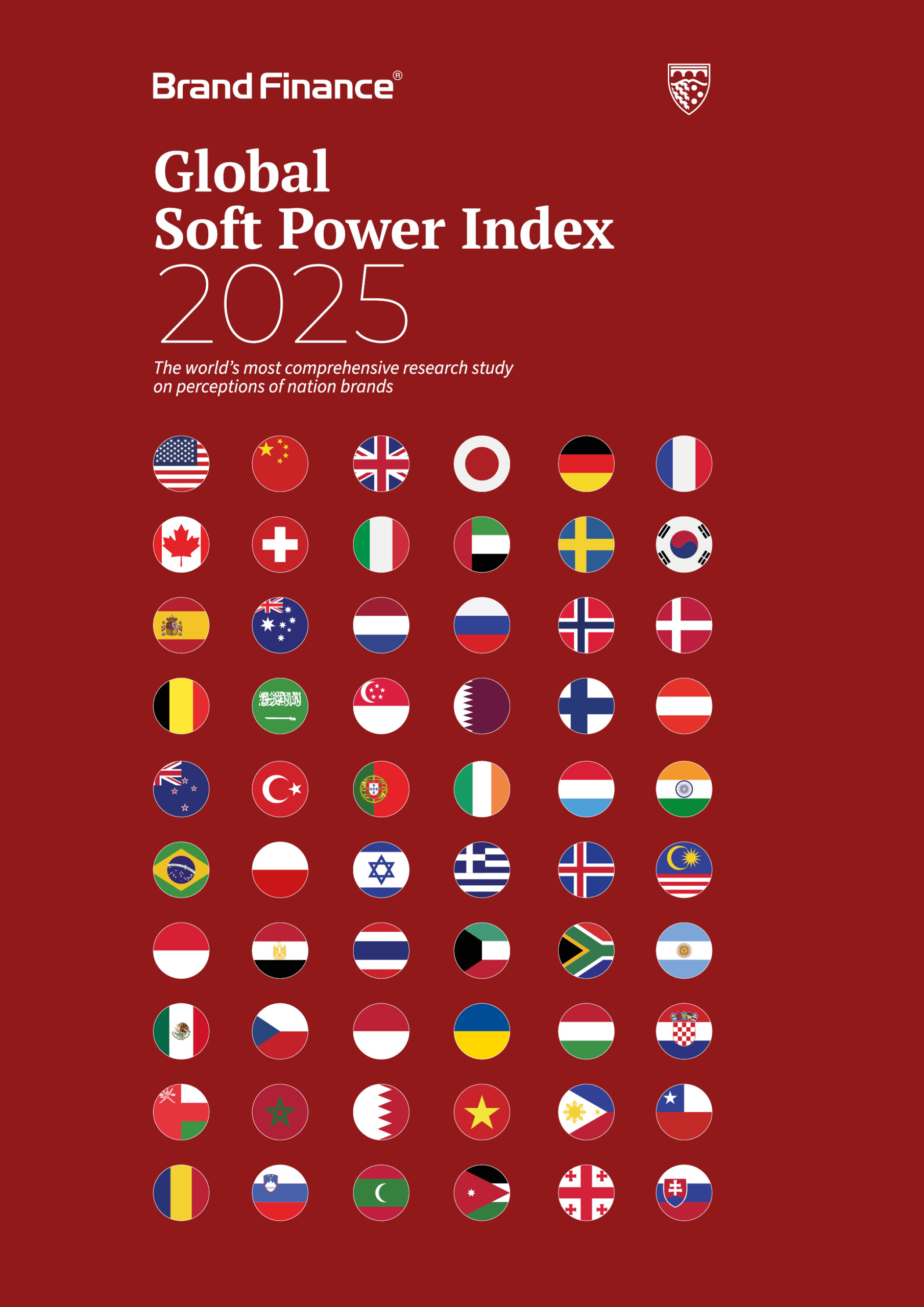This article was originally published in the Brand Finance Global Soft Power Index 2025

Place Branding Director,
Brand Finance
The zero-sum game of Soft Power
The Global Soft Power Index 2025 offers a year-on-year measurement of all 193 member states of the United Nations, after expanding the scope last year. This like-for-like comparison reveals a growing divergence in Soft Power potential between nations, with stronger nations advancing faster while weaker ones fall further behind.
The data illustrates this divide: the top 10 nations saw an average score increase of +0.9 points, while the bottom 10 experienced a steep decline of -3.0 points.
The same is true across broader segments - the top 50 nations averaged a +0.5 increase, compared to a -1.6 drop among the bottom 50. Even within the top 100, scores rose by +0.3 on average, while the remaining 93 countries declined by -1.2, reflecting a widening gap where gains by leading nations often come at the expense of others. While experts previously posited that all nation brands might experience a gradual score inflation over time, the data now suggests a zero-sum game, with winners and losers. The global public’s capacity to develop familiarity with and admiration for nation brands seems finite, favouring prominent countries and those making deliberate efforts to stand out. Less familiar nations struggle to capture attention and affection in this highly competitive environment.

Superpower at a crossroads
The United States maintains its position at the top of the Global Soft Power Index, scoring 79.5 out of 100. Again, it leads in Familiarity and Influence and ranks first in three of the eight Soft Power pillars: International Relations, Education & Science, and Media & Communications.
However, the nation’s overall score has stagnated, likely due to internal political tensions and the polarising nature of the presidential campaign which was underway during the time of polling. Reflecting this turbulent context, Reputation has taken a hit, falling four positions to rank 15th globally.
There has also been a noticeable decline in key pillars that underpin Reputation, particularly Governance, which dropped four positions to 10th, and People & Values, down 10 positions in the ranking to 36th.
For the third consecutive year, there has been a decrease in perceptions of ‘political stability and good governance’. Other crucial attributes have declined, including ‘high ethical standards and low corruption,’ ‘generosity,’ ‘trustworthiness’, and being ‘safe and secure.’ Notably, the US ranks 124th for being ‘friendly,’ pinpointing a significant weakness in its Soft Power profile.
With President Donald Trump returning to office, the country’s global image may face further shifts in the coming years, adding an element of unpredictability to its Soft Power dominance and future trajectory.
The sun rises in the East
China has climbed to second place in the Index with a score of 72.8 out of 100, achieving its highest position to date and surpassing the UK for the first time. This improvement can be attributed to strategic efforts to enhance its global image, including the Belt and Road infrastructure projects, a renewed focus on sustainable development, stronger product brands, and the country's reopening to visitors post-pandemic.
The nation's strong performance is reflected in statistically significant gains across six of the eight Soft Power pillars and improvements in 24 of 35 nation brand attributes.
China has addressed perceptual weaknesses, particularly in the country’s People & Values, up 18 positions this year. Overall, five of the lowest-ranked attributes from the previous year show the most significant increases: ‘generous’ (+27 ranks), ‘friendly’ (+25 ranks), ‘good relations with other countries’ (+24 ranks), ‘easy to communicate with’ (+20 ranks), and ‘fun’ (+15 ranks). These efforts have helped bolster China’s global perceptions.
However, further attention to enhancing its cultural appeal and social perceptions could provide additional momentum in building its Reputation, where the nation currently only ranks 27th, showing no improvement from 2024. At the same time, the United Kingdom has fallen to third place for the first time since the pandemic, reflecting a period of stagnation in its nation brand perceptions.
While there have been no sharp declines in scores or rankings, the lack of substantial improvement across key pillars - particularly Business & Trade, falling one position to rank 6th globally, and Governance, now ranked 3rd - highlights the need for revitalisation. The UK must provide clearer and more consistent leadership on global issues to regain momentum. Creating the UK Soft Power Council is a welcome step in bolstering Britain's potential as a global player.
Shifting sands in the Middle East
In recent years, Middle Eastern nations have made strides in Soft Power. However, this growth appears to be losing momentum, with many of the region’s countries experiencing a decline in their global rankings. The United Arab Emirates is the exception, retaining 10th position, buoyed by strong perceptions of Business and Trade, International Relations, and overall Influence.
The UAE is second globally for being ‘easy to do business in and with,’ reflecting its pro-business policies. It also ranks in the top 10 for other Business & Trade attributes, namely ‘future growth potential’ and ‘strong and stable economy’, driven by fiscal strength, a favourable investment climate, and ongoing economic diversification.
However, others in the region are losing ground: Saudi Arabia has dropped two positions to 20th, and Qatar has fallen one spot to 22nd. A decline in the perceptions of Gulf countries is becoming evident among respondents from the Middle East, Africa, and Asia, who view the region less favourably than before. While most of these markets still hold Gulf countries in high regard, overall scores have decreased, potentially reflecting a shift in sentiment. Africa and Asia are key demographics for the Gulf economies, as migrants from these regions form the backbone of the workforce, supporting sectors such as construction, hospitality, and domestic services and contributing significantly to economic growth and cultural diversity.
K-popular like South Korea
South Korea has emerged as the fastest-improving nation among those ranked in the top 100 last year, moving up three places to 12th following a +2.2-point increase in its Soft Power score. This rise is underpinned by greater Familiarity and statistically significant gains across six of the eight pillars.
Attributes such as ‘advanced technology and innovation’ and ‘advanced in science’ highlight South Korea’s cutting-edge achievements. At the same time, the global success of K-pop and acclaimed films and TV shows have strengthened its scores in arts, entertainment, and media, boosting its international profile.
South Korea has recently come under pressure after President Yoon Suk Yeol's declaration of martial law, which led to his impeachment and sparked an ongoing constitutional crisis. While these events could raise concerns over trust and harm South Korea’s global reputation, they may also strengthen its image, showcasing resilience as the nation swiftly overturned martial law and upheld its democratic institutions.
El Salvador's meteoric rise
In comparison, El Salvador is the fastest-rising nation across the whole ranking, jumping 35 spots to 82nd following a +3.2-point increase in its Soft Power score. Under the transformative leadership of President Nayib Bukele, the country has been thrust into the global spotlight, gaining greater recognition. This has led to improvements across all eight Soft Power pillars.
Once notorious as one of the world’s most violent nations, El Salvador is now perceived as much safer. This transformation is primarily attributed to President Bukele’s decisive measures, including the Territorial Control Plan, which has drastically reduced gang violence and homicides.
These efforts are reflected in the country’s progress in the Governance pillar, with improvements in being perceived as ‘safe and secure’ and ‘politically stable and well-governed’ with ‘high ethical standards and low corruption.’ El Salvador has also advanced in Business & Trade, earning higher scores for its ‘strong and stable economy,’ ‘easy to do business in and with,’ and ‘advanced in technology and innovation.’ Though controversial, its 2021 decision to adopt Bitcoin as legal tender has driven economic growth, boosted tourism, and attracted foreign investment.
Hard Power and Soft Power
Nations engaged in military conflicts continue to see declines in Soft Power scores. Israel has fallen to 33rd place - its lowest position to date. More than a year after the October 7 attack by Hamas on Israel and Israel’s invasion of Gaza in response, the Israeli-Palestinian conflict continues to heavily impact the nation’s global perceptions, evidenced by a sharp 42-place decline in Reputation to 121st. Tensions remain high, with the ceasefire deal fragile and President Trump’s takeover plan for Gaza adding further division and uncertainty.
Ukraine faces ongoing struggles to maintain global support since Russia’s full-scale invasion in February 2022. This year, its overall score dropped by -1.0 point, causing a drop of two places to 46th. Three years on, perceptions of Ukraine’s Soft Power have weakened, with Reputation plummeting 19 places to 95th - below Russia’s 75th - highlighting divided global views on the war. Governance has also declined, down 17 places to 77th, and Familiarity fell four spots to 20th, underscoring the difficulty of sustaining international attention and sympathy.
Russia holds its position at 16th in the Index despite facing widespread condemnation in Western countries for its aggression towards Ukraine. Its Reputation score remains relatively stable, bolstered by strong support from Eastern allies, underscoring the sharp regional divide in perceptions of Russia.
The Russian point of view
After pausing fieldwork in Russia for the 2023 and 2024 Index surveys, we have re-included the views of the Russian general public on nation brands in the 2025 survey. Undertaking opinion polling in Russia complements a holistic overview of nation brand perceptions that accounts for all geographic perspectives. It provides valuable insight into how perceptions of the outside world have changed in Russia three years after its aggression against Ukraine.
Consequently, the Soft Power rankings of the nation brands that Russians are most familiar with – its neighbours – have been affected. Belarus (+7 to 80th), Azerbaijan (+3 to 81st), and Armenia (+13 to 93rd) have risen, benefiting from their political and historical ties with Russia. In contrast, the Baltic states, Georgia (-5 to 59th) and Moldova (-8 to 126th), have seen declines, as their closer alignment with the West and resistance to Russian influence has led to more negative perceptions within Russia.
A new chapter for Bangladesh
Bangladesh’s decline from 96th to 104th in the ranking may be surprising, especially following the 2024 revolution that toppled Sheikh Hasina’s authoritarian government, as many expected to see a new momentum behind the nation brand.
However, market differences are key in explaining this dynamic, with perceptions among Indian respondents dropping significantly. Due to its status as the world’s most populous country, India's weight in the Index has had a notable impact. One of the nation brands that punch much below their weight in Soft Power, Bangladesh finally has the opportunity to reshape its global perceptions and forge a stronger position on the world stage.

